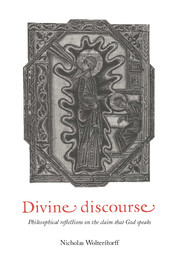Book contents
- Frontmatter
- Contents
- Preface
- 1 Locating our topic
- 2 Speaking is not revealing
- 3 The many modes of discourse
- 4 Divine discourse in the hands of theologians
- 5 What it is to speak
- 6 Could God have and acquire the rights and duties of a speaker?
- 7 Can God cause the events generative of discourse?
- 8 In defense of authorial-discourse interpretation: contra Ricoeur
- 9 In defense of authorial-discourse interpretation: contra Derrida
- 10 Performance interpretation
- 11 Interpreting the mediating human discourse: the first hermeneutic
- 12 Interpreting for the mediated divine discourse: the second hermeneutic
- 13 Has Scripture become a wax nose?
- 14 The illocutionary stance of biblical narrative
- 15 Are we entitled?
- 16 Historical and theological afterword
- Notes
- Index
11 - Interpreting the mediating human discourse: the first hermeneutic
Published online by Cambridge University Press: 01 June 2011
- Frontmatter
- Contents
- Preface
- 1 Locating our topic
- 2 Speaking is not revealing
- 3 The many modes of discourse
- 4 Divine discourse in the hands of theologians
- 5 What it is to speak
- 6 Could God have and acquire the rights and duties of a speaker?
- 7 Can God cause the events generative of discourse?
- 8 In defense of authorial-discourse interpretation: contra Ricoeur
- 9 In defense of authorial-discourse interpretation: contra Derrida
- 10 Performance interpretation
- 11 Interpreting the mediating human discourse: the first hermeneutic
- 12 Interpreting for the mediated divine discourse: the second hermeneutic
- 13 Has Scripture become a wax nose?
- 14 The illocutionary stance of biblical narrative
- 15 Are we entitled?
- 16 Historical and theological afterword
- Notes
- Index
Summary
Interpretation, on the expressionist view of discourse characteristic of the Romantics, traverses the process of discourse in reverse. Whereas speakers start from inner life and then form and implement a plan for producing externalizations expressive of that inner life, interpreters start from the externalizations and proceed by inference to the inner life of which those were, by intent, expressive.
It's an elegant picture; but misleading. The essence of discourse lies not in the relation of expression holding between inner life and outer signs, but in the relation of counting as holding between a generating act performed in a certain situation, and the speech act generated by that act performed in that situation. The goal of interpretation, correspondingly, is to discover what counts as what. The discourser takes up a normative stance in the public domain by way of performing some publicly perceptible action.
Nonetheless, the Romantics had their eye on something real. Typically there's something that the discourser wants to say, some speech action he wants to perform; his desire to do that may or may not be motivated by the desire to express some inner state. To perform that speech action, he has to causally bring about (or a deputy of his has to causally bring about) some action which will count-generate that speech action. In the case in which he speaks in his own name, he performs and then implements an action-plan; he causally brings about some action which he believes will count-generate the speech action on which he has his eye.
- Type
- Chapter
- Information
- Divine DiscoursePhilosophical Reflections on the Claim that God Speaks, pp. 183 - 201Publisher: Cambridge University PressPrint publication year: 1995



